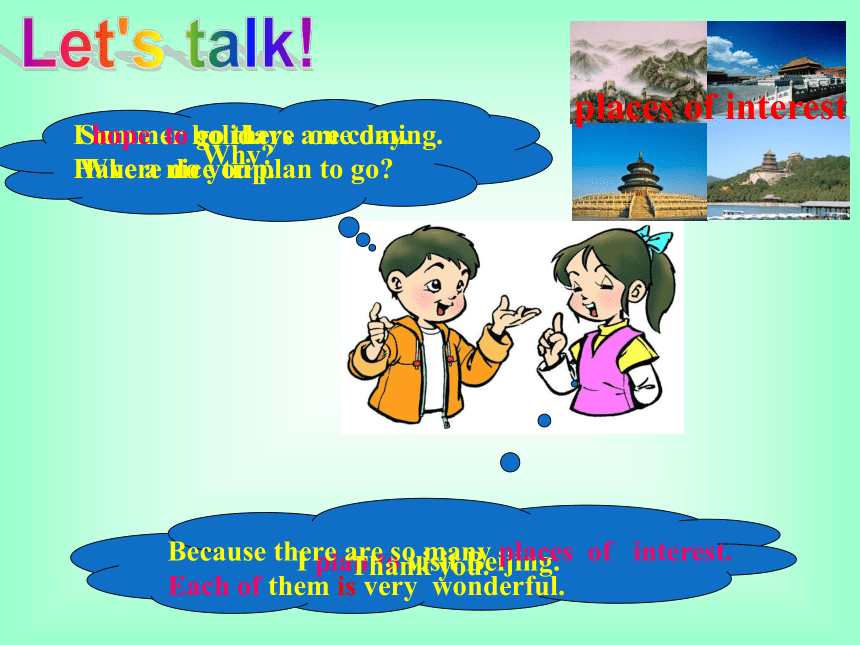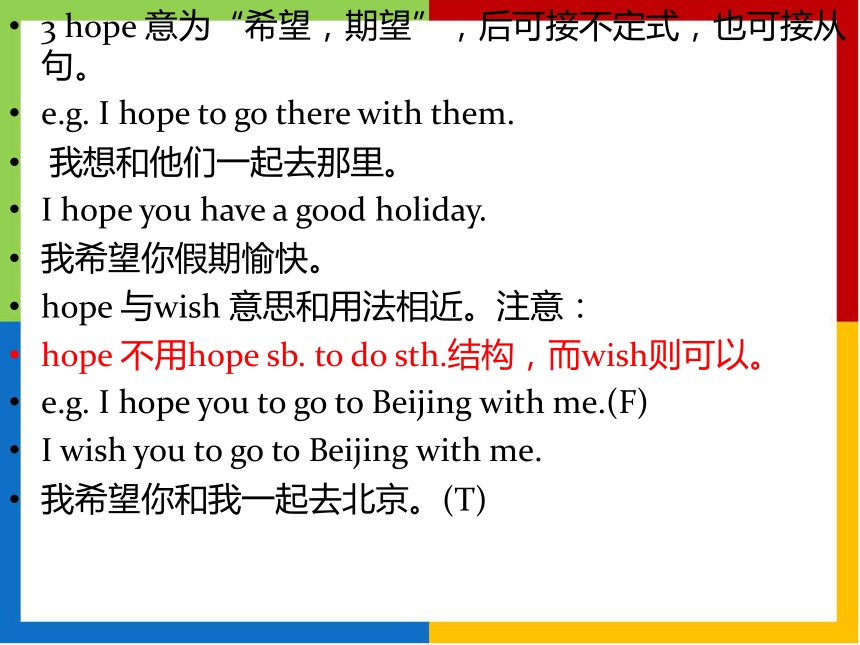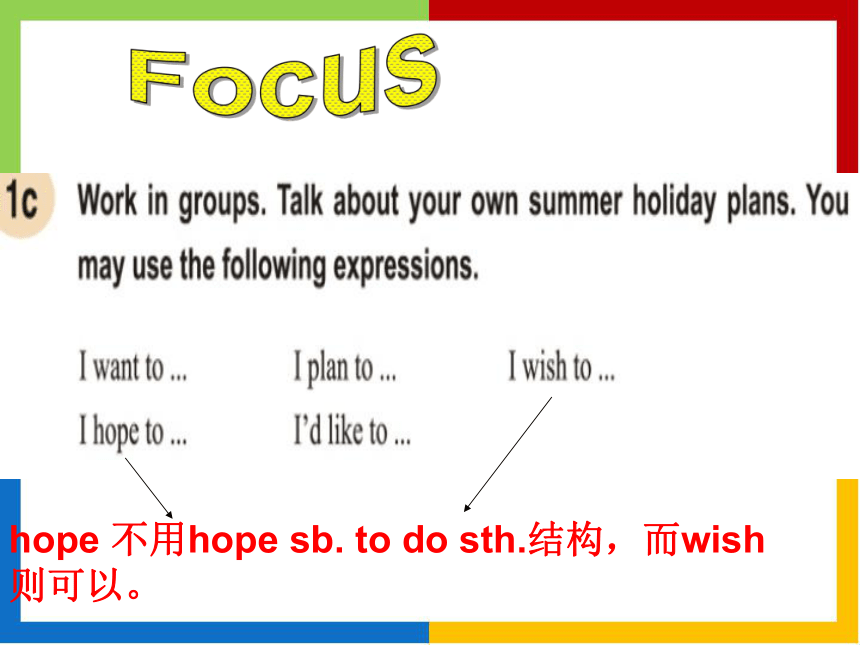仁爱版七年级英语下册课件 3A Unit 8 Topic 2 The summer holidays are coming(共54张PPT)
文档属性
| 名称 | 仁爱版七年级英语下册课件 3A Unit 8 Topic 2 The summer holidays are coming(共54张PPT) |

|
|
| 格式 | zip | ||
| 文件大小 | 10.4MB | ||
| 资源类型 | 教案 | ||
| 版本资源 | 科普版 | ||
| 科目 | 英语 | ||
| 更新时间 | 2017-04-01 00:00:00 | ||
图片预览












文档简介
课件54张PPT。Unit 8 The Seasons and the WeatherTopic 2 The summer holidays are coming.Section A10/21/2018Let's talk!Summer holidays are coming. Where do you plan to go?I plan to visit Beijing.Why?Because there are so many places of interest.
Each of them is very wonderful.places of interestI hope to go there one day.
Have a nice trip.Thank you.
What are your plans for summer holidays?I want to get together with my grandparents. What about you?I wish to travel around the city in Chongqing and take some pictures.1 travel around the country
周游全国
2 get together with
与……团聚,是动词词组。
e.g. Tom hopes to get together with his families at once.
汤姆希望马上与他的家人团。
另外,get-together指“聚会,联欢会”,是名词。
e.g. They always have a family get-together to celebrate their festival.
他们总是举办一个家庭聚会庆祝他们的节日。3 hope 意为“希望,期望”,后可接不定式,也可接从句。
e.g. I hope to go there with them.
我想和他们一起去那里。
I hope you have a good holiday.
我希望你假期愉快。
hope 与wish 意思和用法相近。注意:
hope 不用hope sb. to do sth.结构,而wish则可以。
e.g. I hope you to go to Beijing with me.(F)
I wish you to go to Beijing with me.
我希望你和我一起去北京。(T)Focushope 不用hope sb. to do sth.结构,而wish则可以。What can you see in the picture?the Great WallWhich country is it in ?Chinathe Big BenEnglandTaj MahalIndiaBenzGermanyJapanCanadaBrazilThailandNew ZealandIndonesiaCan you say these countries?( )1.—What’s your plan for summer holidays, Michael?
—I wish _____ Australia and take lots of pictures.
A. to travel around B. traveling around
C. to travel for D. travelling for
( )2. They are new students and _____ of them _____ a new schoolbag.
A. each; have B. each; has
C. every; has D. every; have
( )3.—When you go on a visit to Beijing, you should’t miss the Great Wall. It’s beautiful.
—_____
A. It sounds very interesting! B. Why not?
C. Thank you all the same. D. I won’t do that again.ABAUnit 8 The Seasons and the WeatherTopic 2 The summer holidays are coming.Section BThere are so many places of interest , such as the Great Wall, the Palace Museum, West Lake and so on in our country.What places of interest do you know in China?Where do you want to go?What would you like to take for your trips?I want to take a bag. I can put many things in it.I plan to take a tent,
because I can sleep outdoors.The sun shines brightly in summer.
I want to take a pair of sunglasses.I want to have a camera with me.
I can use it to take pictures.1 anytime,
在任何时候,随便什么时候”。
e.g. Call me anytime/any time.
随时给我打电话。
2 You shouldn’t miss Xishuangbanna.
你不该错过西双版纳。
此句是表达建议的句子。情态动词should意为“应该”,后面接动词原形,表示劝告、建议等,其否定形式 shouldn’t 意为“不应该”。
e.g. You should get to school on time.
你应该按时到校。
You shouldn’t speak to your mother like that.
你不该那样对你母亲说话。3 sound
听起来,在此句中是连系动词,后接形容词或介词短语。
e.g. That music sounds wonderful.
那音乐听起来很美妙。
Your idea sounds like a good one.
你的主意听起来不错。
sound 还可作名词,意为“声音”,指自然界中的各种声音。
e.g. I like the sound of the water.
我喜欢这水声。Language notes:1. What’s the best time to go there?
It is the best time to do sth.
正是干某事的最好时间。
2. I think you can go anytime. The weather there is always fine all year round.
anytime意为“在任何时候,随便什么时候”
all year round “一年到头”
3. You shouldn’t miss Xishuangbanna.
should, 情态动词, 意为 “应该”, 表示劝告, 建议、命令等。否定形式为shouldn’t。Work in pairs and practice 1a. Then make up a new conversation about your hometown. Pay attention to the ways of asking questions and making suggestions. Questions
...,can you tell me something about...?
What's the best time to go there?
What places should I visit in...?
What should I take with me? Suggestions
You should visit...
You shouldn't miss...
You'd better take...
You'd better not take...1c Suppose you're going on a trip. Work in groups and discuss the following questions.1.Where would you like to go?
2.What's the weather like there?
3.How do you plan to go there?
4.Who would you like to go with?
5.What places of interest would you like to visit?
6.How much money do you plan to take?
7.What else would you like to take for your trip?主+should/shouldn’t+动词原形It’s the best time to do sth. You’d better+动词原形Important phrases:
all year round
and so on
take sth. with sb.
Summary( )4.—It’s the best time _____ in summer.
—You’re right. But don’t go _____ alone.
A. to swim; to swim B. swimming; swimming
C. swimming; to swim D. to swim; swimming
( )5.—How are you doing?
—_____
A. I’m doing my homework. B. I’m going by bus.
C. I’m fine, thanks. D. OK. Let me see.
( )6. There will be the 18th sports meeting of No. 2 High School next month. The students are busy _____ it.
A. to prepare for B. preparing for
C. to preparing for D. prepareDCBUnit 8 The Seasons and the WeatherTopic 2 The summer holidays are coming.Section CCan you tell me something about Yunnan?What should Jane take with her to Yunnan? She had better take a camera, a pair of sunglasses, a map and so on.What would you like to take for the trip?I think you should take a camera.
Because you can use it to take photos.
Then you can share the fun with your friends.乐趣share...with sb.
与某人分享...You should take a map with you.
It can help you decide what you want to visit.决定Don't go swimming. It's too dangerous.
If you like to swim, remember you shouldn't swim alone.You shouldn't stay in the sun too long.Attention !停留1 keep you safe 保证你的安全。这里是keep+宾语+形容词(宾补).
e.g. We must keep our classroom clean every day.
我们必须每天保持教室干净。
2 Where you want to go
你想去的地方,从句作动词plan的宾语,这样的句子叫宾语从句。
3 decide
动词,决定,后面通常接不定式。
dicide to do sth.
决定做某事。
e.g. I decide to go to Shanghai tomorrow.
我决定明天去上海。
Read 1a and write what you should and shouldn't do on a trip.You should...
1.travel with a friend
2.carry a map
3.drink safe water and put on a hat and a pair of sunglasses
You shouldn't...
1.go to dangerous places
2.stay in the sun too long
3.swim aloneSuppose Kangkang wants to climb a mountain with his friends. Discuss it with your partners and check( √ )what they should or shouldn't do.√远离( )7.—What time did you _____ Beijing?
—At about 4:00 p. m. yesterday.
A. arrive in B. arrive C. arrive at D. arrived
( )8.—Please _____ animals like tigers in the zoo.
—OK, we will, Mr. Lee.
A. keep from B. keep away C. keep far away D. keep away from
( )9.—Please give my love to your parents, Kangkang.
—_____, Michael!
A. Thank you very much B. No problem
C. It’s wonderful D. You’re so cool
( )10.—Meimei, could you tell me _____ about Beijing?
—Of course.
A. anything B. everyone C. something D. everythingADACUnit 8 The Seasons and the WeatherTopic 2 The summer holidays are coming.Section DGrammarMake sentences with want/plan/wish/hope/would like to.Start605958575655545352515049484746454443424140393837363534333231303029282726252423222120191817161514131211109876543210605958575655545352515049484746454443424140393837363534333231303029282726252423222120191817161514131211109876543210Make sentencesFunctionsMatch the questions with the correct answers.CAEBDDo you know something about Sichuan?Mount EmeiJiuzhaigouI went to Sichuan last year. And I arrived there by plane.The people there were very friendly.The food there was very hot and nice. Dear Cao Yan,
How are you doing? I had a wonderful trip in Sichuan. I arrived there by plane with my family on May 3rd. The weather was sunny and warm that day. I stayed there for only three days, but I had a good time. I visited some places of interest, such as Mount Emei and Jiuzhaigo. We also took some photos and enjoyed the delicious food. It was very hot and nice, and very different from our food. People there were very friendly and helped us find our way. We thanked them so much. We bougtht many gifts in the shops there. Guess what I bought for you!
Please give my love to your parents.
Yours,
JackRead and complete the table.1 How are you doing?
是问候语。相当于
How are you?
你好吗?/你过得好吗?Read the passage aloud.Summary1.Useful expressions:
How are you doing?/How are you?
arrive in/at=get to 到达
be friendly to=be kind to 对某人友好
give one's love to sb.向某人问好
2.Review the expressions of talking about future plans and intentions.
I want to/plan to/wish to/ hope to/would like to...
3. Review the expressions of making suggestions.
You should.../You shouldn't...
You'd better.../Don't.../Remember to...
Thank you
Each of them is very wonderful.places of interestI hope to go there one day.
Have a nice trip.Thank you.
What are your plans for summer holidays?I want to get together with my grandparents. What about you?I wish to travel around the city in Chongqing and take some pictures.1 travel around the country
周游全国
2 get together with
与……团聚,是动词词组。
e.g. Tom hopes to get together with his families at once.
汤姆希望马上与他的家人团。
另外,get-together指“聚会,联欢会”,是名词。
e.g. They always have a family get-together to celebrate their festival.
他们总是举办一个家庭聚会庆祝他们的节日。3 hope 意为“希望,期望”,后可接不定式,也可接从句。
e.g. I hope to go there with them.
我想和他们一起去那里。
I hope you have a good holiday.
我希望你假期愉快。
hope 与wish 意思和用法相近。注意:
hope 不用hope sb. to do sth.结构,而wish则可以。
e.g. I hope you to go to Beijing with me.(F)
I wish you to go to Beijing with me.
我希望你和我一起去北京。(T)Focushope 不用hope sb. to do sth.结构,而wish则可以。What can you see in the picture?the Great WallWhich country is it in ?Chinathe Big BenEnglandTaj MahalIndiaBenzGermanyJapanCanadaBrazilThailandNew ZealandIndonesiaCan you say these countries?( )1.—What’s your plan for summer holidays, Michael?
—I wish _____ Australia and take lots of pictures.
A. to travel around B. traveling around
C. to travel for D. travelling for
( )2. They are new students and _____ of them _____ a new schoolbag.
A. each; have B. each; has
C. every; has D. every; have
( )3.—When you go on a visit to Beijing, you should’t miss the Great Wall. It’s beautiful.
—_____
A. It sounds very interesting! B. Why not?
C. Thank you all the same. D. I won’t do that again.ABAUnit 8 The Seasons and the WeatherTopic 2 The summer holidays are coming.Section BThere are so many places of interest , such as the Great Wall, the Palace Museum, West Lake and so on in our country.What places of interest do you know in China?Where do you want to go?What would you like to take for your trips?I want to take a bag. I can put many things in it.I plan to take a tent,
because I can sleep outdoors.The sun shines brightly in summer.
I want to take a pair of sunglasses.I want to have a camera with me.
I can use it to take pictures.1 anytime,
在任何时候,随便什么时候”。
e.g. Call me anytime/any time.
随时给我打电话。
2 You shouldn’t miss Xishuangbanna.
你不该错过西双版纳。
此句是表达建议的句子。情态动词should意为“应该”,后面接动词原形,表示劝告、建议等,其否定形式 shouldn’t 意为“不应该”。
e.g. You should get to school on time.
你应该按时到校。
You shouldn’t speak to your mother like that.
你不该那样对你母亲说话。3 sound
听起来,在此句中是连系动词,后接形容词或介词短语。
e.g. That music sounds wonderful.
那音乐听起来很美妙。
Your idea sounds like a good one.
你的主意听起来不错。
sound 还可作名词,意为“声音”,指自然界中的各种声音。
e.g. I like the sound of the water.
我喜欢这水声。Language notes:1. What’s the best time to go there?
It is the best time to do sth.
正是干某事的最好时间。
2. I think you can go anytime. The weather there is always fine all year round.
anytime意为“在任何时候,随便什么时候”
all year round “一年到头”
3. You shouldn’t miss Xishuangbanna.
should, 情态动词, 意为 “应该”, 表示劝告, 建议、命令等。否定形式为shouldn’t。Work in pairs and practice 1a. Then make up a new conversation about your hometown. Pay attention to the ways of asking questions and making suggestions. Questions
...,can you tell me something about...?
What's the best time to go there?
What places should I visit in...?
What should I take with me? Suggestions
You should visit...
You shouldn't miss...
You'd better take...
You'd better not take...1c Suppose you're going on a trip. Work in groups and discuss the following questions.1.Where would you like to go?
2.What's the weather like there?
3.How do you plan to go there?
4.Who would you like to go with?
5.What places of interest would you like to visit?
6.How much money do you plan to take?
7.What else would you like to take for your trip?主+should/shouldn’t+动词原形It’s the best time to do sth. You’d better+动词原形Important phrases:
all year round
and so on
take sth. with sb.
Summary( )4.—It’s the best time _____ in summer.
—You’re right. But don’t go _____ alone.
A. to swim; to swim B. swimming; swimming
C. swimming; to swim D. to swim; swimming
( )5.—How are you doing?
—_____
A. I’m doing my homework. B. I’m going by bus.
C. I’m fine, thanks. D. OK. Let me see.
( )6. There will be the 18th sports meeting of No. 2 High School next month. The students are busy _____ it.
A. to prepare for B. preparing for
C. to preparing for D. prepareDCBUnit 8 The Seasons and the WeatherTopic 2 The summer holidays are coming.Section CCan you tell me something about Yunnan?What should Jane take with her to Yunnan? She had better take a camera, a pair of sunglasses, a map and so on.What would you like to take for the trip?I think you should take a camera.
Because you can use it to take photos.
Then you can share the fun with your friends.乐趣share...with sb.
与某人分享...You should take a map with you.
It can help you decide what you want to visit.决定Don't go swimming. It's too dangerous.
If you like to swim, remember you shouldn't swim alone.You shouldn't stay in the sun too long.Attention !停留1 keep you safe 保证你的安全。这里是keep+宾语+形容词(宾补).
e.g. We must keep our classroom clean every day.
我们必须每天保持教室干净。
2 Where you want to go
你想去的地方,从句作动词plan的宾语,这样的句子叫宾语从句。
3 decide
动词,决定,后面通常接不定式。
dicide to do sth.
决定做某事。
e.g. I decide to go to Shanghai tomorrow.
我决定明天去上海。
Read 1a and write what you should and shouldn't do on a trip.You should...
1.travel with a friend
2.carry a map
3.drink safe water and put on a hat and a pair of sunglasses
You shouldn't...
1.go to dangerous places
2.stay in the sun too long
3.swim aloneSuppose Kangkang wants to climb a mountain with his friends. Discuss it with your partners and check( √ )what they should or shouldn't do.√远离( )7.—What time did you _____ Beijing?
—At about 4:00 p. m. yesterday.
A. arrive in B. arrive C. arrive at D. arrived
( )8.—Please _____ animals like tigers in the zoo.
—OK, we will, Mr. Lee.
A. keep from B. keep away C. keep far away D. keep away from
( )9.—Please give my love to your parents, Kangkang.
—_____, Michael!
A. Thank you very much B. No problem
C. It’s wonderful D. You’re so cool
( )10.—Meimei, could you tell me _____ about Beijing?
—Of course.
A. anything B. everyone C. something D. everythingADACUnit 8 The Seasons and the WeatherTopic 2 The summer holidays are coming.Section DGrammarMake sentences with want/plan/wish/hope/would like to.Start605958575655545352515049484746454443424140393837363534333231303029282726252423222120191817161514131211109876543210605958575655545352515049484746454443424140393837363534333231303029282726252423222120191817161514131211109876543210Make sentencesFunctionsMatch the questions with the correct answers.CAEBDDo you know something about Sichuan?Mount EmeiJiuzhaigouI went to Sichuan last year. And I arrived there by plane.The people there were very friendly.The food there was very hot and nice. Dear Cao Yan,
How are you doing? I had a wonderful trip in Sichuan. I arrived there by plane with my family on May 3rd. The weather was sunny and warm that day. I stayed there for only three days, but I had a good time. I visited some places of interest, such as Mount Emei and Jiuzhaigo. We also took some photos and enjoyed the delicious food. It was very hot and nice, and very different from our food. People there were very friendly and helped us find our way. We thanked them so much. We bougtht many gifts in the shops there. Guess what I bought for you!
Please give my love to your parents.
Yours,
JackRead and complete the table.1 How are you doing?
是问候语。相当于
How are you?
你好吗?/你过得好吗?Read the passage aloud.Summary1.Useful expressions:
How are you doing?/How are you?
arrive in/at=get to 到达
be friendly to=be kind to 对某人友好
give one's love to sb.向某人问好
2.Review the expressions of talking about future plans and intentions.
I want to/plan to/wish to/ hope to/would like to...
3. Review the expressions of making suggestions.
You should.../You shouldn't...
You'd better.../Don't.../Remember to...
Thank you
同课章节目录
- Unit 5 Our school life
- Topic 1 I usually come to school by subway.
- Topic 2 A few students are running around the play
- Topic 3 My school life is very interesting.
- Unit 6 Our local area
- Topic 1 Is there a computer in your study?
- Topic 2 My home is in an apartment building.
- Topic 3 Which is the way to the hospital?
- Review of Units 5-6
- Unit 7 The Birthday
- Topic 1 When is your birthday?
- Topic 2 Can you sing an English song?
- Topic 3 Everyone had a good time.
- Unit 8 The seasons and the Weathe
- Topic 1 What's the weather like in summer?
- Topic 2 The summer holidays are coming.
- Topic 3 Let’s celebrate!
- Review of Units 7-8
- 旧版资料
- Unit 5 Our School Life
- Unit 6 Our Local Area
- Unit 7 The Birthday
- Unit 8 The seasons and the Weathe
- Unit 7 Celebrating the Birthday(老版本)
